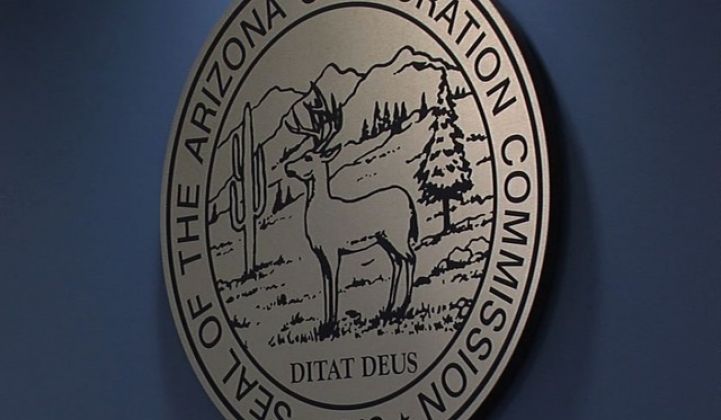SolarCity has dropped its support for the Checks and Balances Project, a watchdog group known for using hardline tactics to advance its environmental and clean energy agenda.
Last year, the group launched a high-profile campaign against Arizona regulators, alleging Commissioner Bob Stump exchanged hundreds of text messages with a utility executive at Arizona Public Service (APS), the head of a "dark money" group with ties to APS, and candidates running for seats on the Arizona Corporation Commission (ACC).
Checks and Balances claims the phone records reveal inappropriate ties between the Arizona regulator and the state’s largest utility, as well as possible electioneering. The public records investigation seeks to expose bias against the solar industry in Arizona, where regulators approved a $5 monthly fee for rooftop solar customers and have allowed investor-owned utilities to launch their own rooftop solar programs.
APS admitted to funding advertisements and organizations in favor of changing rooftop solar policy in 2013, and is widely believed to have donated $3.2 million to elect its preferred candidates to the ACC in 2014. Checks and Balances aims to make corporate ties more transparent.
Somewhat ironically, SolarCity only disclosed it was a financial backer of the Checks and Balances Project in December, after competitor Sunrun issued a statement that it was not involved with the watchdog group. SolarCity’s funding was provided via the Renew American Prosperity Fund, which is not required to disclose its donors. Sunrun’s statement put pressure on SolarCity, which revealed its support for Checks and Balances when asked. The disclosure came shortly after SolarCity cut ties with The Alliance for Solar Choice, a lobby group spearheaded by Sunrun.
SolarCity has changed its advocacy spending strategy again. A spokesperson confirmed to Greentech Media this week that the company has quit funding the Checks and Balances Project, but did not offer any further commentary.
Scott Peterson, executive director of the Checks and Balances Project, underscored that SolarCity is just one of the group’s backers and that the organization will continue to carry out its public records investigation in Arizona, as well as other campaigns.
“Over six years, we’ve developed a high-impact watchdog blog that has held the fossil-fuel lobby accountable. We’re grateful for the general support that SolarCity has provided us, and we intend to continue our work in a number of areas, including: captured regulators, oil industry influence, transparency in clean energy news reporting and government studies, as well as government ethics and accountability,” Peterson wrote in an email. “We’ll do that with the support of a growing list of funders, which now includes philanthropist Lucy Rockefeller Waletzky and the Silicon Valley legend Brad Mattson.”
SolarCity’s decision to distance itself from the Checks and Balances Project comes as Jon Wellinghoff, former chairman of the Federal Energy Regulatory Commission, takes the role of chief policy officer. While the precise reasoning is unclear, dropping support for Checks and Balances could signal a change of tone under Wellinghoff as SolarCity seeks to win regulatory support for net metering and other state policies.
Commissioner Stump criticized SolarCity last year for supporting Checks and Balances’ hard-line tactics, while attacking utilities for taking similar actions. “I just find it astonishing that the biggest U.S. provider of rooftop solar power is funding the effort to harass regulators whose decisions affect their bottom lines,” Stump told The Arizona Republic.
Stump believes solar advocates are attempting to intimidate regulators, who are considering new fees for rooftop solar customers. Wellinghoff may have seen SolarCity’s link to Checks and Balances as counterproductive to the company’s broader policy objectives.
Meanwhile, the public records investigation against Stump has hit a roadblock. Last month, a judge ruled that Stump’s text messages are not a matter of public record. As a result, Checks and Balances will not get to see the content of the messages.
Checks and Balances was specifically seeking 3,598 messages sent to 18 individuals between mid-2014 and early 2015. The Arizona Attorney General’s office retrieved only 36 text messages relevant to the investigation, all of which were blank.
Peterson has pledged to continue the fight. On April 15, Checks and Balances filed a new motion in court requesting access to Commissioner Stump’s text history or an evidentiary hearing to review the Attorney General’s search.
“We filed our motion on Friday...because there are simply too many unanswered questions about the downloading of Commissioner Stump’s iPhone,” he said. “Arizonans deserve access to public records, not continued gamesmanship by the Arizona Corporation Commission and Attorney General Brnovich’s office.”



